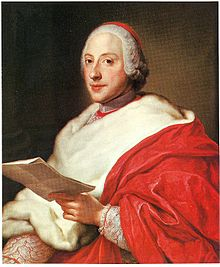Regency Personalities Series-Henry Benedict Stuart
Regency Personalities Series
In my attempts to provide us with the details of the Regency, today I continue with one of the many period notables.
Henry Benedict Stuart
6 March 1725 – 13 July 1807

Henry Benedict Stuart
Henry Benedict Stuart was born in exile at the Palazzo Muti in Rome on 6 March 1725 and baptized on the same day by Pope Benedict XIII, 37 years after his grandfather James II and VII lost the throne, and ten years after his father’s failed attempt to regain it. His father was James Francis Edward Stuart, known to his opponents as “the Old Pretender”. His mother was the Princess Maria Klementyna Sobieska, granddaughter of the Polish King, John III Sobieski.
Henry went to France in 1745 to help his brother, Prince Charles Edward Stuart (“Bonnie Prince Charlie”, or “the Young Pretender”) prepare the Jacobite campaign of that year. After its defeat, Henry Stuart returned to Italy. On 30 June 1747 Pope Benedict XIV conferred him with tonsure and created him Cardinal-Deacon of S. Maria in Portico in a special consistory held on the 3 July 1747. On 27 August 1747 he was promoted to the four minor orders by the Pope. He received the subdiaconate on 18 August 1748 and diaconate on 25 August 1748. He was ordained priest on 1 September 1748 and consecrated titular Archbishop of Corinth on 2 October 1758.
He was advanced to the order of Cardinal Priest in 1748, maintaining title to S. Maria in Portico. In 1752 he transferred to the titulus of Ss. XII Apostoli. He was made Cardinal-Bishop of Frascati on 13 July 1761, and eventually succeeded to the See of Ostia and Velletri on his appointment as Dean of the Sacred College of Cardinals on 26 September 1803. He lived and worked in Frascati for many years, descending each afternoon in his carriage to Rome, where his position as vice-chancellor entitled him to the Palazzo della Cancelleria.
His revenues from the many ecclesiastical preferments he enjoyed were enormous. His income from abbeys and other pluralities in Flanders, Spain, Naples and France amounted to 40,000 Pounds in British money at the time. He also held sinecure benefices yielding revenues in Spanish America. He owned territory in Mexico, which contributed largely to his income.
Henry was the last claimant to the British throne to touch for the King’s Evil.
At the time of the French Revolution, he lost his French Royal benefices and sacrificed many other resources to assist Pope Pius VI. This, in addition to the seizure of his Frascati property by the French, caused him to descend into poverty. The British Minister in Venice arranged for Henry to receive an annuity of £4,000 from King George III of Great Britain. Although the British government represented this as an act of charity, Henry and the Jacobites considered it to be a first installment on the money which was legally owed to him. (For many years the British government had promised to return the English dowry of his grandmother, Mary of Modena, but never did so.)
Henry returned to Frascati in 1803. In September of that year he became the Dean of the College of Cardinals and hence Cardinal Bishop of Ostia and Velletri, though he still lived in the episcopal palace at Frascati. He died there on 13 July 1807, aged 82.





